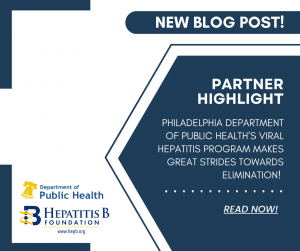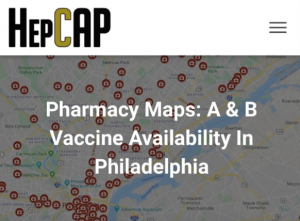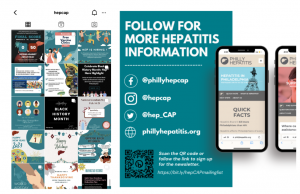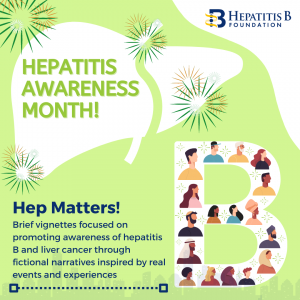
Hep Matters: Brief vignettes focused on promoting awareness of hepatitis B and liver cancer through fictional narratives inspired by real events and experiences
The Scenario

Amina was born and raised in Kandahar, Afghanistan. At the age of 17, she moved to the United States with her family. During a routine check-up with her primary care doctor, Amina discovered that she had hepatitis B. She had never heard of the disease and explained that she always takes care of herself. The doctor told her that hepatitis B is a virus that damages the liver, and anyone can get it unless they are vaccinated to protect against it. Amina recalled that she never received any vaccinations for hepatitis B. Her family members were also unaware of how hepatitis B gets transmitted.
 Amina asked her doctor how she could get rid of this virus. Her doctor explained to her that there is no cure for hepatitis B, but antiviral treatment options do exist. While she may not be able to completely get rid of the virus, she can help protect herself from serious conditions such as hep B related cirrhosis or liver cancer with treatment. Amina’s doctor encouraged her to get treatment to prevent any serious problems from occurring. He also mentioned that treatment for hepatitis B is safe and effective. This did not make any sense to Amina. She thought to herself that if a treatment wouldn’t cure her of the disease, then there is no point in taking it. She felt healthy and did not show any symptoms. After the doctor suggested treatment options, she said that she will wait for the cure.
Amina asked her doctor how she could get rid of this virus. Her doctor explained to her that there is no cure for hepatitis B, but antiviral treatment options do exist. While she may not be able to completely get rid of the virus, she can help protect herself from serious conditions such as hep B related cirrhosis or liver cancer with treatment. Amina’s doctor encouraged her to get treatment to prevent any serious problems from occurring. He also mentioned that treatment for hepatitis B is safe and effective. This did not make any sense to Amina. She thought to herself that if a treatment wouldn’t cure her of the disease, then there is no point in taking it. She felt healthy and did not show any symptoms. After the doctor suggested treatment options, she said that she will wait for the cure.
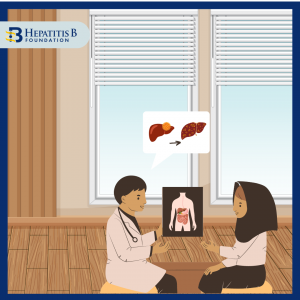 After moving to the U.S., Amina had gotten busy with school and work and did not follow up with her primary care doctor for years. Amina experienced stomach pains from time to time but they often went away on their own. On one occasion, her stomach pain worsened. She had to take a few days off from work to get better using home remedies, but they didn’t help. Finally, she went to the doctor’s office to learn more. She discovered that she had liver cancer. Her doctor referred her to a hepatologist (a liver specialist) for further treatment.
After moving to the U.S., Amina had gotten busy with school and work and did not follow up with her primary care doctor for years. Amina experienced stomach pains from time to time but they often went away on their own. On one occasion, her stomach pain worsened. She had to take a few days off from work to get better using home remedies, but they didn’t help. Finally, she went to the doctor’s office to learn more. She discovered that she had liver cancer. Her doctor referred her to a hepatologist (a liver specialist) for further treatment.
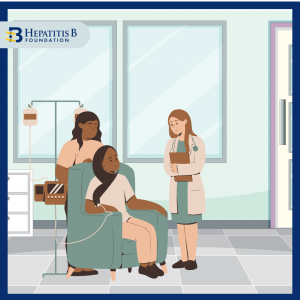 The hepatologist explained to Amina that hepatitis B can lead to liver cancer without monitoring and treatment. Even though a cure is not available, treatment options do exist, and they help in slowing and preventing serious liver disease, liver damage or liver cancer. If Amina had started antiviral treatment on time, she could have saved her liver. The doctor recommended chemotherapy for Amina to treat the cancer. Not only did her medical bills go up but Amina felt physically and mentally exhausted by the procedures. She advocates for everyone living with hepatitis B to get treatment if they need it and not wait for the cure. She also participates in advocacy efforts to make treatment options more affordable for people living with hepatitis B.
The hepatologist explained to Amina that hepatitis B can lead to liver cancer without monitoring and treatment. Even though a cure is not available, treatment options do exist, and they help in slowing and preventing serious liver disease, liver damage or liver cancer. If Amina had started antiviral treatment on time, she could have saved her liver. The doctor recommended chemotherapy for Amina to treat the cancer. Not only did her medical bills go up but Amina felt physically and mentally exhausted by the procedures. She advocates for everyone living with hepatitis B to get treatment if they need it and not wait for the cure. She also participates in advocacy efforts to make treatment options more affordable for people living with hepatitis B.
The Challenge:
Lack of awareness:
Amina and her family had little knowledge about hepatitis B before her diagnosis. They were not vaccinated, which put them at an increased risk of getting hepatitis B. Even after her diagnosis, Amina did not take the time to fully understand her diagnosis, what lifestyle she needs to follow, or available treatment options. Not knowing enough about one’s hepatitis B diagnosis can put people at risk for more serious problems in the future such as liver cancer.
Barriers to treatment
After her doctor went over the treatment options, Amina decided to wait for a cure. While it is not clear if financial reasons played a role in her decision to not get treatment, the cost of treatment is certainly an important factor when considering treatment options for many people. Not having insurance coverage, high out-of-pocket costs, and side effects from medication can be barriers to getting treatment for hepatitis B.
Difference between the cure and the current treatment for hepatitis B
Instead of getting treatment, Amina decided to wait until a cure is available for hepatitis B. It is very important to understand the difference between treatment for hepatitis B and a potential cure. While scientists are working on finding an effective cure, it is not yet available. The process of getting a new medication approved for use is very long and consists of many procedures and steps, to ensure safety and effectiveness. The available treatment for hepatitis B is very effective in preventing serious liver problems such as cancer as it can control the long-term effects of the virus on the liver. There are many different treatment options available to reduce the symptoms, help people feel better, and prevent progression of hepatitis B to advanced liver disease such as liver cancer.
What Can You Do?
Don’t wait!
After receiving your diagnosis, the most important step is to not wait and to get connected with care immediately. Schedule an appointment with your doctor and discuss your results. Take the time to understand your diagnosis and ask important questions. Discuss treatment options. Sometimes, treatment is not needed but other times, it’s important to start treatment right away. Encourage your friends and family to get screened and vaccinated for hepatitis B.
Find Resources!
The Hepatitis B Foundation has excellent resources on all things related to hepatitis B knowledge, prevention, and treatment. Check out some of our resources below:
Information about hepatitis B:
- https://www.hepb.org/resources-and-support/fact-sheets/
Community support:
- https://www.hepbcommunity.org/
Medication assistance programs
- https://www.hepb.org/treatment-and-management/patient-assistance-programs-in-the-u-s/
Resources for those newly diagnosed
- https://www.hepb.org/prevention-and-diagnosis/newly-diagnosed/
Hepatitis B research institute
- https://www.blumberginstitute.org/


